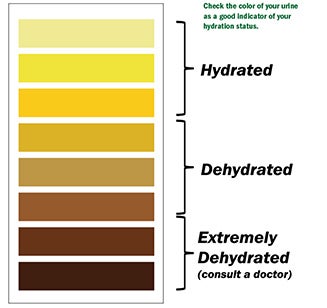H 2 the O, An All-Day Affair!
Posted in Announcements Blog Fitness Fitness & Wellness Corner News
July 2019 Fitness & Wellness Corner
By Christie L. Simoson, Assistant Fitness Director
Hydration. Why is it so important? Should you hydrate differently each day? And what is considered ‘hydrated’ anyway? How can you actually tell if you are well hydrated?
Hydration is one of those things that is so easily controllable, yet so many of us may put our body’s hydration status on the backburner on a day-to-day basis (guilty!!). One should not hydrate just in preparation for special events or races. Hydration should be an everyday thing and can be pretty easy when you know how. I will share some tips and tricks to help make hydration a habitual behavior of our everyday lives!
What are some good reasons I should stay hydrated?
To name a few, fluids help to: control your body’s temperature, aid digestion, carry nutrients throughout your body, cushion organs and joints, and keep your bowel movements regular (DoC, 2014). It can also help protect your spinal cord and other sensitive tissues, and assist in getting rid of waste through urination, perspiration, and bowel movements (CDC, 2016). Lastly, water assists in normalizing your blood pressure and maintaining electrolyte (sodium) balance (Godman, 2018).
How do I know if I am dehydrated?
Look for signs or symptoms such as:
- thirst
- chapped lips or dry mouth
- dry skin
- flushed skin
- headache
- nausea
- fainting
- low energy (feeling tired)
- a decrease in urine output
a darker color urine with a strong odor (see chart below)- low blood pressure
- high heart rate
Signs of severe dehydration include:
- confusion
- blotchy skin
- high fever
- rapid breathing
- unconsciousness
- cold hands and feet

This info is great, but how do you suggest I stay hydrated?
There’s no one-size-fits-all answer. That may not have been what you wanted to hear, but just listen to your body! A good general rule of thumb is to start your day with 8-16 oz of water and then continue to sip it throughout the day. Consuming at least 32 oz of water during your workout should keep you adequately hydrated. Naturally,
How do you become dehydrated when you exercise?
When we exercise, our body uses various fuels (carbohydrates, fats, and protein) to provide energy for our muscles to work. The breakdown of these fuel substrates and the resulting muscular contraction produce heat that increases core temperature. To prevent excessive heat buildup, our body responds by increasing skin blood flow and sweat secretion. Heat exchange between the skin and environment, especially via sweat evaporation, is the primary mechanism for dissipating the excess heat. Although necessary, this crucial process also results in a loss of body water and electrolytes, AKA sweat, which can lead to dehydration.
A little sweat is a good thing. Too much sweat – and not replacing your fluids – can lead to bad things (refer to bullet points above). Your body actually needs additional liquids in hot climates, during physical activity, if you are running a fever, or are having diarrhea or vomiting (CDC, 2016).
Are there other factors that can contribute to dehydration?
There are a number of additional factors that can affect fluid loss such as:
- Clothing
- Wear breathable fabric such as cotton
- If a hat is necessary, wear a visor or a hat that has pores to allow heat to be released
- Wear lighter colors (i.e. white, gray) when exercising outside. Dark colors such as black or navy blue can attract sunlight, increasing your temperature
- Humidity/heat (temperature)
- Skin exposure (i.e. shorts preferred over pants)
So how do we stay adequately hydrated during exercise?
Drink according to your thirst sensation; no more and no less. Try drinking every 15-20 minutes during exercise. During extreme weather conditions, fluid intake and pace may require additional adjustment. For prolonged exercise, beverages containing 6-8% carbohydrate may provide an additional benefit; consuming sodium will enhance fluid ingestion and retention (i.e. a sports drink).
Okay, so we learned that fluids = good, dehydration = bad. What are our other options if we don’t care
Don’t like water? That’s okay. Think of other hydrating options. This can include both beverages AND food. Try adding some frozen fruit to your water (yum!). Some of my favorites include cucumbers, blueberries, lemons, limes, raspberries, strawberries, oranges, and mint– not all mixed together at once of course. You can play around with different flavors and see what you like! Other beverages such as milk, veggie or fruit juice, broth, or soft drinks can assist in staying hydrated as well (DoC, 2014). Or, if you would rather snack, try foods that have large water content such as watermelon, celery, pineapple, cantaloupe, lettuce, or peppers.
Take home message?!
Listen to your body and consume a healthy amount of fluids throughout the day!! Not only do fluids assist in regulating bodily functions, but we need it in order to survive. Please take Bobby Boucher’s advice (and mine) – stay hydrated!
References:
Center for Disease Control and Prevention (2016). Get the Facts: Drinking Water and Intake | Nutrition | CDC. Retrieved from https://www.cdc.gov/nutrition/data-statistics/plain-water-the-healthier-choice.html
Dieticians of Canada (2014). Guidelines for drinking fluids to stay hydrated. Retrieved from https://www.dietitians.ca/getattachment/becace49-3bad-4754-ac94-f31c3f04fed0/FACTSHEET-Guidelines-for-staying-hydrated.pdf.aspx
Godman, H. (2018). Harvard Health Publishing. How much water should you drink? Retrieved from https://www.health.harvard.edu/staying-healthy/how-much-water-should-you-drink
Navy Installations Command. (n.d.). Hydrate. Retrieved from https://www.navyfitness.org/nutrition/noffs-fueling-series/hydrate
This blog post was written to provide educational information only. This article should not be used as a substitute or a replacement for professional medical advice, diagnosis, or treatment. If you have questions or concerns about your personal health, you should always consult with your physician. It is recommended that you consult with your physician or health care professional before beginning any fitness regimen to determine if it is suitable for your needs. The use of any information provided by this article is solely at your risk.
